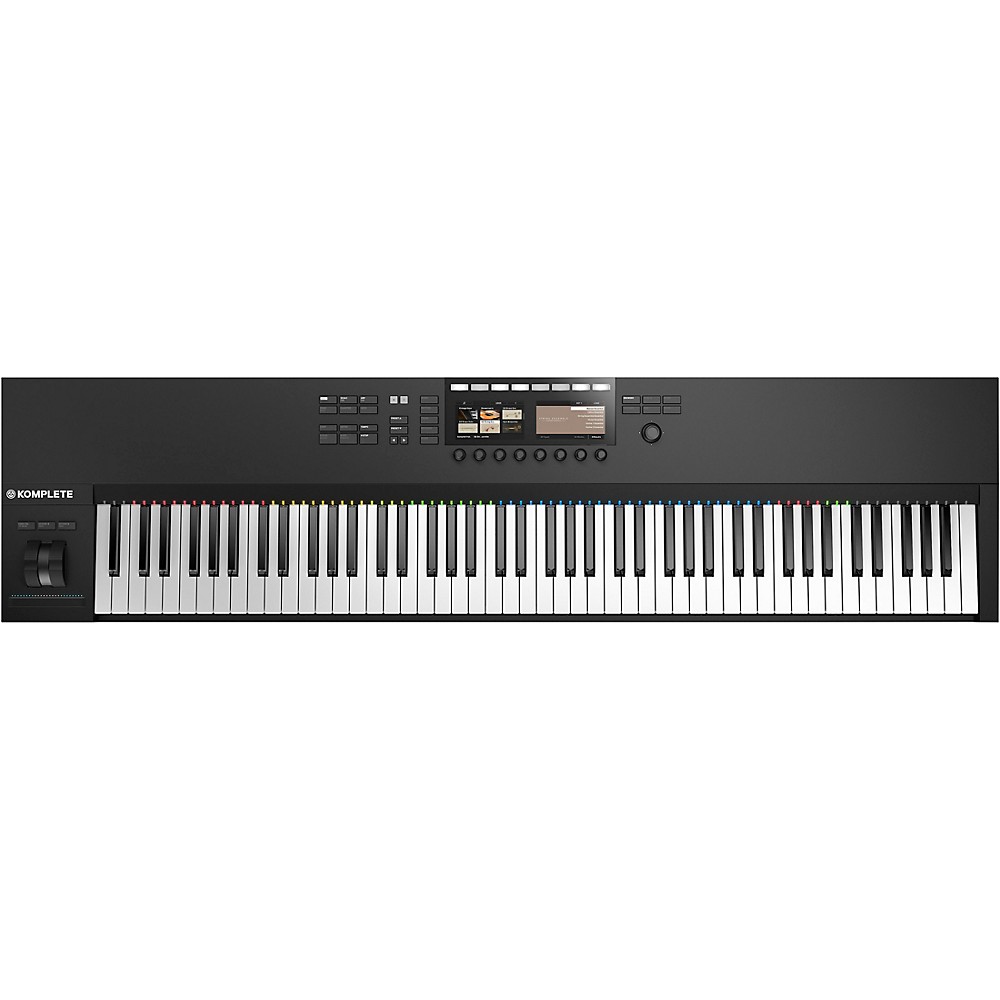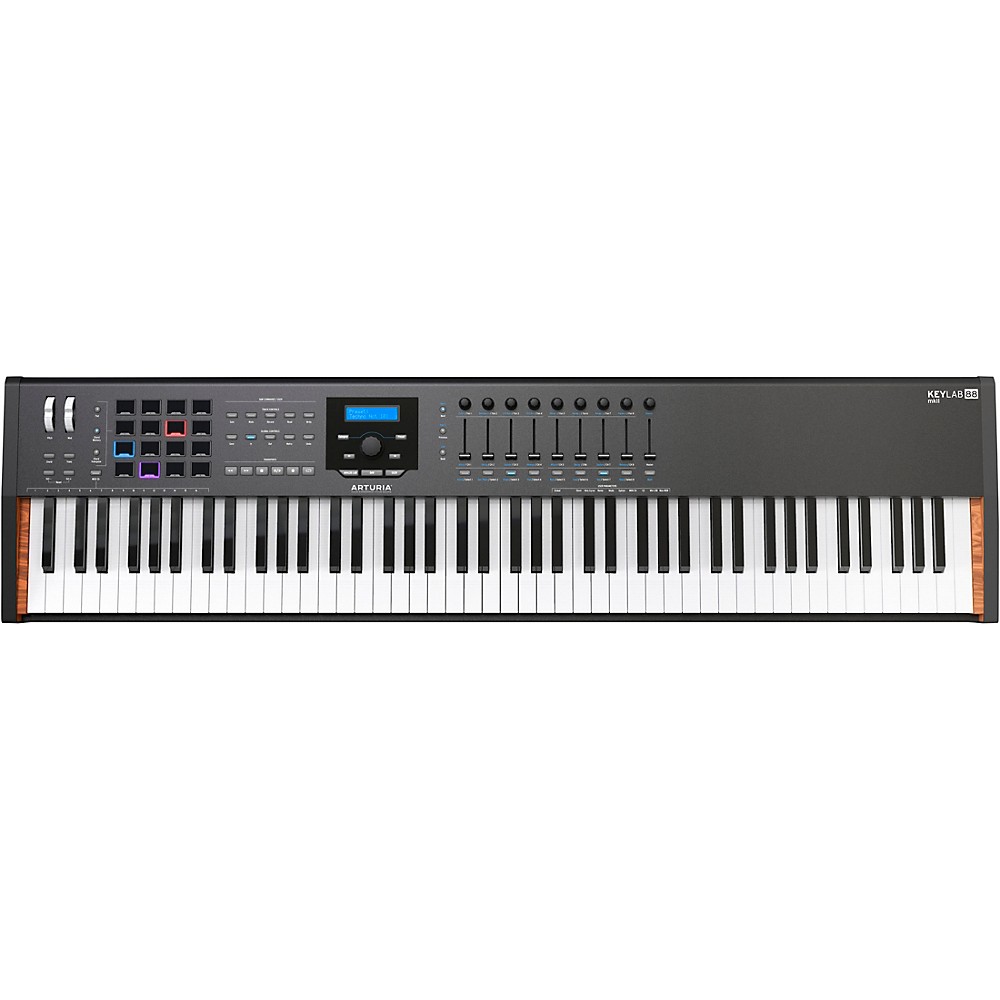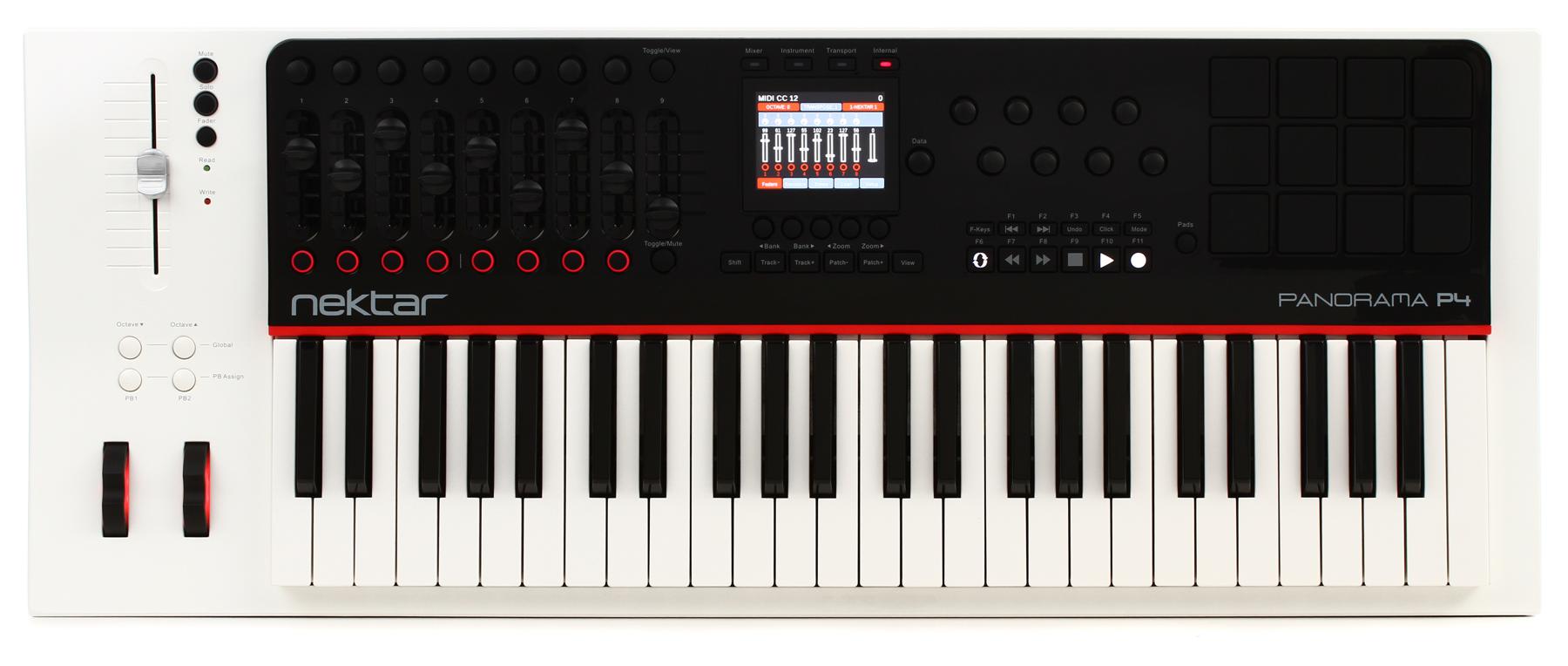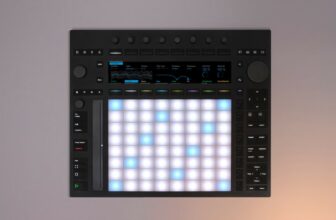The 7 Best MIDI Controllers With Weighted Keys (2024)
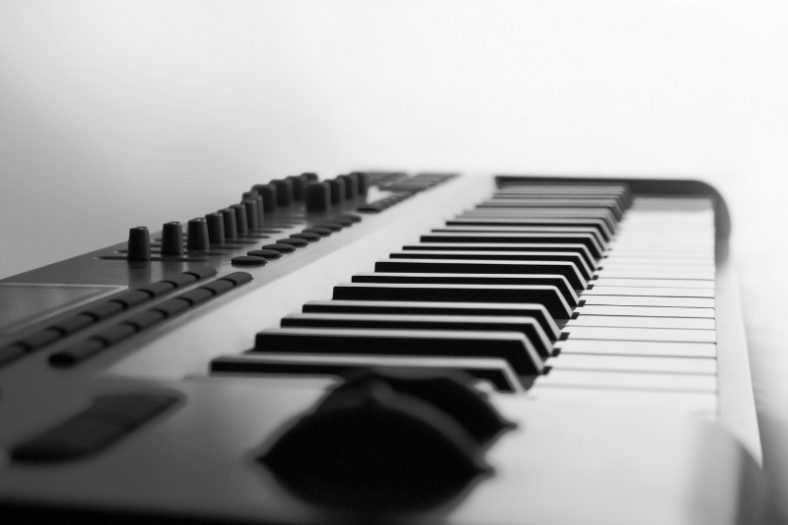
MIDI keyboards are essential parts of a music studio for producing any type of music. As most piano players want the feel of an analog piano on a workstation of music production, the key weight and type are vital for a good MIDI keyboard.
MIDI keyboards with weighted keys offer next-level playability and an authentic piano feel for dynamic performances. Depending on what key size you prefer, the market is stacked with suitable MIDI keyboards with weighted keys, however, the list below features my top seven choices.
My top MIDI controller with weighted keys is the M-Audio Hammer 88, a great full-size keyboard with hammer-action keys that allow limitless expression.
You can also check out the Alesis VI61 if you are after a more budget-friendly MIDI controller, as it features a great value for the offered price with its feature-packed and portable design.
Contents
- The 7 Best MIDI Controllers With Weighted Keys (2024)
- 1. M-Audio Hammer 88
- 2. Alesis VI61
- 3. Native Instruments Komplete Kontrol S88 Mk2
- 4. Alesis Recital Pro - 88 Key
- 5. Novation 61SL MkIII
- 6. Arturia KeyLab 88 MkII
- 7. Nektar Panorama P4
- What are the different types of weighted keys?
- Are weighted keys harder or easier to handle?
- What are the benefits of weighted keys on a MIDI controller?
- What is the optimal number of keys to aim for?
- What to look for in a MIDI controller with Weighted Keys?
- Conclusion
The 7 Best MIDI Controllers With Weighted Keys (2024)
Let’s compare these in more detail.
1. M-Audio Hammer 88
The M-Audio Hammer 88 is one of the most realistic feeling keyboard controllers today with its full-size keyboard with 88 fully-weighted, velocity-sensitive hammer action keys. The controller is fully focused on the feel and expression of an authentic piano, without the extra frills of other MIDI controllers.
Pros
- Full-size keyboard with great-feeling hammer action keys
- Editor app for MIDI functions customization
- A good amount of pedal input ports
- Included software bundle
Cons
- Keys do not have aftertouch
Besides the great-feeling keyboard, the Hammer 88 has inputs for sustain, expression, and soft pedals. The pitch bend and modulation wheels, along with volume and octave controls, are located on the left-hand side of the keys, which is more comfortable to use than the ones in the top position, in my opinion.
The controller comes with Ableton Live Lite and Hammer 88 software editor, which you can use to customize features such as keyboard zones and velocity curves.
The drawbacks are the keys’ lack of aftertouch and the overall weight of the unit. As it is a full-size keyboard with weighted keys, it is a heavy MIDI keyboard, making it less portable.
| Weight Type | Fully-Weighted |
| Key Type | Hammer-action velocity-sensitive keys |
| Number Of Keys | 88 |
| Controls | Pitchbend, modulation, volume, and octave controls |
| Compatibility | OS X 10.8 or newer, iOS, Windows 7 SP1 or newer |
| Included Software | Ableton Live Lite, Hammer 88 software editor |
If playing synths and organs or making grooves with pads is your primary goal Hammer 88 is not for you. However, the M-Audio Hammer 88 is an ideal choice for piano players who want a full-size MIDI keyboard that feels as close to a piano as possible.
2. Alesis VI61
The Alesis VI61 is an excellent choice for tighter budgets with its 61 aftertouch-equipped velocity-sensitive keys and fully-featured design. With its 16 RGB Pads, 16 assignable knobs, pitch-bend, mod wheels, and 48 buttons, the keyboard gives you more than enough versatility and control over your playing.
Pros
- Great value for the price
- A good amount of controls with 16 drum pads and 16 assignable knobs
- Portable design
- Full-size velocity-sensitive keys
Cons
- Not the best build quality
- Semi-weighted keys
The 61-key controller features a compact and relatively lightweight design, making it convenient for musicians on the go. Plus, it comes with MPC Beats, Ableton Live Lite, and Xpand!2 software to get you started producing music immediately. There is a 1/4″ sustain pedal input on the device along with a USB type B which is used to connect the device to the computer.
The main drawback of the Alesis VI61 is its overall build quality. While the keys and the body feel great and sturdy, the pads and the controllers feel quite cheap. Also, the software integration process requires some work.
| Weight Type | Semi-weighted |
| Key Type | Full-size velocity-sensitive with aftertouch |
| Number Of Keys | 61 |
| Controls | 16 x RGB Backlit Pads, Pitchbend, Mod Wheel, 16 x Knobs, 48 x Buttons |
| Compatibility | Windows XP, Vista, 7 and above, Mac 10.4. 11 and above. |
| Included Software | MPC Beats, Ableton Live Lite, and Xpand!2 |
Overall, the Alesis VI61 is a great fully-featured MIDI keyboard for economy-minded players who want a versatile yet affordable MIDI controller.
3. Native Instruments Komplete Kontrol S88 Mk2
If you want a professional-grade MIDI keyboard with an excellent keybed, the Native Instruments Komplete Kontrol S88 Mk2 would probably be the best option.
It comes with an excellent-feeling Fatar keybed with fully-weighted hammer-action keys with velocity sensitivity and aftertouch along with versatile features such as 2 high-resolution screens and many controls to take music production to the next level.
Pros
- Pro-grade Fatar keybed with fully-weighted hammer-action keys
- 2 high-res color screens
- Great integration with main DAWs like Komplete Select, Logic, Ableton
- Light Guide and Smart Play features
Cons
- Pricey
- No drum pads
- No slider controllers
The keys are equipped with multi-colored LED lights, and functions such as Light Guide and Smart Play make playing much more efficient and comfortable for beginner players.
Another great feature is the deep integration of the controller with main DAWs, especially the Komplete Select software but also Logic and Ableton. Plus, the high-resolution screen onboard is great for producing music without the need to look at the computer often.
The main drawback is the steep price of this controller. Also, some users may find the lack of drum pads and slider controllers an issue, but it depends on the use and personal choices.
| Weight Type | Fully-Weighted |
| Key Type | Hammer-action Fatar keybed with full-size velocity-sensitive aftertouch-eqıipped keys |
| Number Of Keys | 88 |
| Controls | Pitchbend, Mod Wheel, Touch Strip Controller, 8 touch-sensitive knobs, DAW transport controls |
| Compatibility | Windows 10 Anniversary Update or later, MacOS 10.12 or later |
| Included Software | Komplete 12 Select |
Finally, the Native Instruments Komplete Kontrol S88 Mk2 comes with Komplete 12 Select software. It is one of the best well-rounded MIDI keyboards out there, with its pro-grade keybed and handy features making music production easier for professionals as well as bedroom composers.
4. Alesis Recital Pro - 88 Key
The Alesis Recital Pro – 88 Key is an entry-level digital piano with a full-sized 88-key keyboard and hammer-action weighted keys. The digital piano is quite versatile with built-in effects such as 12 built-in voice presets and modulation, reverb, and chorus effects, along with a 128-note polyphony function.
Pros
- Fully-sized 88-key keyboard
- Built-in sound effects and 128-note polyphony
- Can work with battery-power
- Good-quality built-in speakers
Cons
- No pitch or mod wheels
- Limited features
It comes with built-in speakers, a battery power option, split mode to use the keyboard divided into two different parts, and layer mode, which allows you to use two presets at the same time, metronome, and record mode. In addition to that, there is the lesson mode feature which makes the device great for learning and performing alike.
Plus, it has a 1/4 “ sustain pedal input, but you will have to buy a pedal separately as it is not included in the package. The digital piano has limited features compared to other MIDI controllers as it comes without pads, assignable parameters, or pitch or mod wheels.
| Weight Type | Fully-weighted Keys |
| Key Type | Full-sized hammer action with adjustable touch response |
| Number Of Keys | 88 |
| Controls | 12 built-in voice buttons, Master Volume knob, Function, and Demo mode controls |
| Compatibility | Windows, Mac |
| Included Software | Skoove 3-month premium subscription |
In short, if you are looking for a digital piano to learn to play piano or advance to the intermediate level, the Alesis Recital Pro 88 Key is a simple device with no frills and great touches to keep you going.
5. Novation 61SL MkIII
The Novation 61SL MkIII is a great MIDI keyboard with 61 full-size semi-weighted synth keys with velocity sensitivity and aftertouch. Plus, it has 16 velocity-sensitive RGB pads, 8 encoders, 8 faders, pitch bend, and mod wheels with RGB light, adding to the versatility.
Pros
- Premium quality keyboard
- Excellent 8-track sequencer
- A great number of connectivity options
- Versatile with a good range of controls
- Great features arpeggiator, scales, keyboard zoning, and DAW control mode
Cons
- A bit pricey
- Semi-weighted keys
- No fader displays
- Not the best navigation
The shining stars of this device are the excellent 8-track sequencer, arpeggiator, scales, keyboard zoning, and DAW control mode, making the device highly versatile. There is also the SL49 model with 49 keys, which is a portable and affordable option from Novation for musicians.
The great number of connectivity options including a 1/4″ (expression), a 1/4″ (sustain), 1a 1/4″ (footswitch) pedal inputs, a clock out, a CV out, two mod outs, two gate outs, MIDI in and out, Out2/Thru and USB ports.
| Weight Type | Semi-weighted |
| Key Type | Full-size synth keys with velocity sensitivity and aftertouch |
| Number Of Keys | 61 |
| Controls | 16 velocity-sensitive RGB pads, 8 Encoders, 8 Faders, pitch bend, a mod wheel with RGB |
| Compatibility | Windows 7 SP1 or later, OS X 10.11.6 or later |
| Included Software | Ableton Live Lite, 4GB Loopmaster Sounds and Samples |
There is not much to say against the Novation 61SL MkIII besides that it is a bit pricey. Piano players may not like the semi-weighted synth-action keys as the fully-weighted keys replicate the authentic feel better. If you have the budget for it, the Novation 61SL MkIII is a top-notch 61-key MIDI controller for music production and live performances with excellent versatility.
6. Arturia KeyLab 88 MkII
The Arturia KeyLab 88 MkII is a top-notch MIDI controller equipped with a weighted hammer-action Fatar TP/100LR keybed with velocity sensitivity and aftertouch for an authentic piano feel. Plus, there are many controls like 16 backlit velocity-sensitive pads, pitch bend, mod wheels, 9 rotary encoders, and 9 faders.
Pros
- Top-notch full-size keyboard with great hammer-action Fatar TP/100LR keybed
- Versatile with 16 pads and a wide range of controls
- Great DAW integration
- Durable build quality
- A good amount of connectivity options
Cons
- Pricey
- Small display
The MIDI controller has excellent integration with major DAWs, and the amount of input-output ports elevates the versatility. Furthermore, the durable build quality is great with aluminum chassis, high-quality pads, encoders, and keys.
The features of this MIDI keyboard make it great for studio use as well as live use, as it makes it easy to utilize and manipulate a lot of software quickly.
| Weight Type | Weighted |
| Key Type | Hammer-action Fatar TP/100LR Keybed with velocity sensitivity and aftertouch |
| Number Of Keys | 88 |
| Controls | 16 x backlit velocity sensitive pads, pitchbend, mod wheel, 9 x Rotary Encoders, 9 x Faders |
| Compatibility | Windows 7 SP1 or later, OS X 10.11 or later |
| Included Software | Ableton Live Lite, Analog Lab Software |
The Arturia KeyLab 88 MkII is one of the best midi keyboards on the market that comes with essential software like Ableton Live and Analog Lab. It will make your performances and studio richer as well as make the processes easier if you have the budget to buy this high-end MIDI controller.
7. Nektar Panorama P4
The Nektar Panorama P4 is a 49-key MIDI keyboard with semi-weighted velocity-sensitive keys with an aftertouch along with many controllers, making it an all-in-one MIDI controller. It is equipped with an LCD screen, 12 pads, 16 encoders, and 10 faders, including a motorized fader, transport controls, pitch bend, and mod wheels.
Pros
- Piano-style keys with velocity sensitivity and aftertouch
- Portable yet durable design
- Deep integration with major DAWs
- Motorized fader
- LCD screen
Cons
- Only 49 keys
- Semi-weighted keys
The piano-style semi-weighted keys feel pretty good, but the aftertouch function differs between the white and black keys, which can be frustrating. The controller has deep integration with most major DAWs, and the portable design is sturdy and durable. Plus, it has good connectivity options with a footswitch and expression pedal inputs along with 2 type B and Micro-B USB ports.
Of course, the 49 keys can be an issue for those who want the full scale of a piano, and some songs might have to be adapted to play. Also, the keys are only semi-weighted which is another drawback for musicians who want the real piano feel with fully-weighted keys.
| Weight Type | Semi-weighted |
| Key Type | piano style keys with velocity sensitivity and aftertouch |
| Number Of Keys | 49 |
| Controls | 12 pads, 16 encoders, 10 faders, Transport controls, pitch bend, and mod wheel |
| Compatibility | Windows, Mac |
| Included Software | PreSonus Studio One Artist DAW |
Overall, the Nektar Panorama P4 is a good workstation for versatile music production with great DAW integration, a good amount of control options, 49 semi-weighted keys, and a bright LCD screen, making navigation much more efficient and easier.
What are the different types of weighted keys?
There are 3 different kinds of weighted keys; semi-weighted, hammer action, and graded weighting.
Hammer action and graded weighting keys are fully weighted and are the best ones to replicate the piano-key feel. The semi-weighted keys are the least recommended for piano practice.
The hammer action keys are made to replicate the hammer action in pianos, as when pressed, they apply a resistance similar to the keys in a piano. Graded weighting keys are built with the same mechanism but feature different resistance levels on the higher and lower keys. The lower keys apply more resistance, while the higher keys are lighter.
The semi-weighted keys are made a bit resistant with springs but do not feel like piano keys.
Are weighted keys harder or easier to handle?
Weighted keys are harder to handle than unweighted keys, but ultimately better for your technique.
Weighted keys offer a traditional piano-like feel compared to unweighted or semi-weighted keys. They provide a more effective practice, helping you develop finger strength and a better technique.
However, all different keys have their advantages. Semi-weighted and unweighted keys are better for more precise rhythmic/contemporary music styles and for use with virtual instruments like synths.
What are the benefits of weighted keys on a MIDI controller?
The weighted keys feel the closest to the acoustic piano keys. They help you develop finger strength and dexterity as well as endurance, stimulate muscle memory, make the transition from the keyboard to piano easier, and allow you to play with expression and dynamics.
What is the optimal number of keys to aim for?
The optimal number of keys depends on personal needs. The average MIDI keybed features 49 keys or four octaves. If you are a serious piano-style player, you should go for a full scale with 88 keys. But, if you want a more portable keyboard, 61-key and 49-key options may be enough.
What to look for in a MIDI controller with Weighted Keys?
When buying a MIDI keyboard controller, you should look for the number of keys, controls, durability, sound quality, and price. Depending on your needs, you can go for a blend of these features.
Number of Keys
An average MIDI keyboard features 49 keys which are great for a portable MIDI keyboard. If you want a fuller scale, you can choose 61 or 88 key options, which are better for a two-handed piano player. But, if you want to use some virtual instruments, and synths and create rhythmic grooves, you do not need that many keys.
The key action type is also important as the fully-weighted keys with high-end graded weighting are the closest to the acoustic piano feel. Fully weighted keys with hammer action are also great and replicate the acoustic piano key feeling well.
Controls
Assuming you are not just going to use your MIDI controller as a piano replacement; you should look for extra control options such as drum pads, faders, mod, and pitch bend wheels, encoders, and transport controls to navigate through your DAW. The more control means, the more control, and versatility you have.
Durability
As with most musical gear, durability is one of the crucial aspects, especially if you are planning to carry your MIDI controller around. Aluminum chassis is more sturdy than plastic-made controllers, but it increases the price.
Connectivity
Decent MIDI keyboard controllers often have at least one pedal input for a sustain pedal. Better ones also have another input for expression pedals. If you are going to use the MIDI controller in a more extensive setup, you should also look for extra connectivity ports like MIDI ins and outs.
Price
The price is arguably the most important consideration. Most MIDI controllers come with the included software. These are great deals for the price, and you should check what you are getting with the device. There are different models for professional and casual music producers with different budgets. Depending on your needs, you can aim for a high-end all-in-one or a simpler device.
Conclusion
MIDI keyboards with weighted keys are great tools for piano players to practice and perform, saving the players from the high prices and big sizes of acoustic pianos. Plus, they are highly versatile for music production, allowing you to use the extra features for more creative expression.
My top recommendation is the M-Audio Hammer 88 with its full-size great-feeling keyboard with hammer-action keys.
My pick among budget-friendly offerings is the Alesis VI61, which shines with its portable and feature-packed design with semi-weighted keys.



